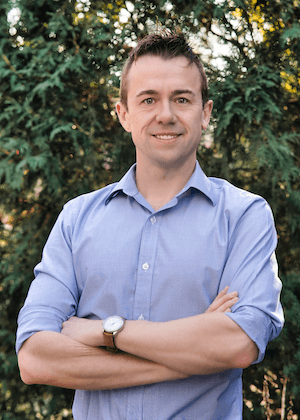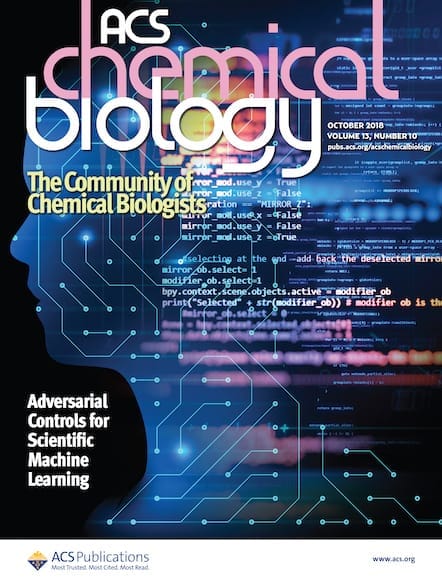Read an interview with Dr. Bryan Dickinson, the inaugural winner of the ACS Chemical Biology Young Investigator Award.

The ACS Chemical Biology Young Investigator Award honors the contributions of an early-career individual who is doing outstanding work in chemical biology. The first winner of this annual award, Dr. Bryan Dickinson from The University of Chicago, will present the ACS Chemical Biology Young Investigator Lecture during the ACS Spring 2023 Meeting & Exposition March 26 – 30 in Indianapolis, IN.
The award is sponsored jointly by ACS Chemical Biology and the ACS Division of Biological Chemistry.
“The review committee was delighted to receive a large number of highly-competitive nominations for the inaugural ACS Chemical Biology Young Investigator award,” said Editor-in-Chief Chuan He. “Following detailed deliberations, we are excited to name Dr. Bryan Dickinson as the winner of the 2022 ACS Chemical Biology Young Investigator Award, for his unique and outstanding contributions to designing and applying both small-molecule-driven and bioengineering-based strategies that enable novel means to perturb, probe, or control, numerous important biological regulatory programs spanning from the lipid signaling to epitranscriptome and RNA targeting. Work from the Dickinson laboratory over the past 8 years pushes the boundaries of chemical biology. This laboratory further demonstrates that when studied with depth and breath, how chemical biologists can bring novel interdisciplinary solutions to address important problems in the life sciences.”

Read a Brief Interview With Dr. Bryan Dickinson
Can you give us a short overview of the research you are currently undertaking and/or the project you are most excited about?
The motivating principle of my group is that our ability as chemists to create functional molecules will lead to new breakthroughs in biology and biotechnology. We are molecule-type agnostic though, engaging in everything from synthetic organic chemistry to create small molecules, molecular evolution to reprogram molecules, and protein/RNA design to develop novel biotechnology platforms. We select problems that we think are important, both in basic biology and translational science, and then do what only chemists can do—think about molecular solutions to those problems, and then go in the lab and create, find, or engineer those molecules!
One subgroup I am very excited about right now is our subgroup developing technologies to harness evolution to engineer and optimize molecules with specific bioactivities. Evolution, nature’s design philosophy, is not only a powerful method for optimizing or redirecting existing molecular function but can also lead to the de novo discovery of novel mechanisms of activity of molecules. I believe this function-first approach to molecular design could be impactful in the ways we discover bioactive molecules, but critically, can also lead to new mechanisms of action.
Over the past seven years, though iterative platform technology development, in particular our group’s proximity-dependent split RNAP biosensing system, we have developed technologies that allow us to rapidly evolve selective molecular interfaces between proteins, to evolve “molecular glues” that drive biomolecular interactions, to evolve biocatalysts, and finally, to evolve selective inhibitors of target biomolecular interactions.
Now, we are using these systems to try to tackle complex biophysical “puzzles” with a disease-focus, such as how to selectively disrupt disease-driving pre-formed protein complexes or how to drive biomolecular interactions with molecular glues to rewire cell signaling. We believe that the throughout and library sizes enabled by our evolution-based systems will yield novel solutions to these puzzles and lay the foundation for new classes of therapeutics.
What’s one piece of advice you’d give to someone just entering the field?
I suggest anyone entering the field of chemical biology really try to identify and follow their passions. There are so many problems facing society today—from seemingly intractable diseases to looming climate and energy disasters. Chemistry can provide some of the solutions to these challenges, and chemical biologists, with their exceptional abilities to build interdisciplinary teams, can help lead those efforts.
I always sought highly interdisciplinary training environments with a “problem-focused,” rather than “technique or model-focused,” approach to science. I would advise burgeoning chemical biologists to find groups to work with that align with your values and passions, who think creatively and interdisciplinarily, and who value team-based science with a mission-driven attitude. At least for me, this has been a fulfilling and energizing way for me to navigate my own career choices and led me to work with two of the best advisors I could possibly imagine for my Ph.D. and postdoc.
Relatedly, one of the things I am most proud of is a PI is my group culture. Our team tackles problems we think are important with bravery, creativity, and a sense of purpose. In short—find science to pursue that you really care about and the people to pursue it with that share your values and passions, and everything will flow beautifully from there!
What new directions in chemical biology do think will be most impactful in the next few years?
I am really interested in the ever-changing role of academic science in the broader biotech and drug discovery ecosystem. Academic science—both discovery and technology development—plays a critically important role in that ecosystem, and increasingly, serves as springboard for young entrepreneurs to build and test innovative ideas and then move them outside of academia to the “real world.”
There are so many exciting therapeutic modalities that emerged from academia that are poised to make major inroads in medicine in the next decade, from CRISPR technologies, to PROTACs and related bifunctional recruiter systems, to RNA-targeting technologies. While chemical biologists have and will continue to serve a critical role as “tool developers” to break down barriers in the study of biology, I think major impacts will be made in changing the paradigms of what a drug can look like and what can be targeted therapeutically.
Related to that goal, I think innovative training environments that help both support and foster diverse trainees to become successful in their futures, which within chemical biology, are increasingly translational and therefore outside of academia, will ensure chemical biology as a field continues to generate leaders in both academia and industry.
In short, there are so many patients in need with seemingly intractable medical problems, but also, so many exciting and innovative ideas out there, I think the next decade will really lead to a golden age of biotechnology, fueled in large part by chemical biology.
Explore Recent ACS Journal Articles by Dr. Bryan Dickinson
- Charting the Chemical Space of Acrylamide-Based Inhibitors of zDHHC20. ACS Med. Chem. Lett. 2022, 13, 10, 1648–1654
- A High-Throughput Fluorescent Turn-On Assay for Inhibitors of DHHC Family Proteins. ACS Chem. Biol. 2022, 17, 8, 2018–2023
- Development of Mild Chemical Catalysis Conditions for m1A-to-m6A Rearrangement on RNA. ACS Chem. Biol. 2022, 17, 6, 1334–1342
- Phage-Assisted Continuous Evolution and Selection of Enzymes for Chemical Synthesis. ACS Cent. Sci. 2021, 7, 9, 1581–1590
- A System for the Evolution of Protein–Protein Interaction Inducers. ACS Synth. Biol. 2021, 10, 8, 2096–2110
- Development of an Acrylamide-Based Inhibitor of Protein S-Acylation. ACS Chem. Biol. 2021, 16, 8, 1546–1556
- Small Molecule-Inducible RNA-Targeting Systems for Temporal Control of RNA Regulation. ACS Cent. Sci. 2020, 6, 11, 1987–1996
- A Phage-Assisted Continuous Selection Approach for Deep Mutational Scanning of Protein–Protein Interactions. ACS Chem. Biol. 2019, 14, 12, 2757–2767
- Activity-Based Sensing of S-Depalmitoylases: Chemical Technologies and Biological Discovery. Acc. Chem. Res. 2019, 52, 11, 3029–3038
- Development of a Split Esterase for Protein–Protein Interaction-Dependent Small-Molecule Activation. ACS Cent. Sci. 2019, 5, 11, 1768–1776
